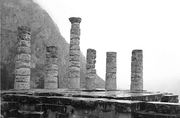Delphi: Difference between revisions
imported>Thomas Wright Sulcer (lemma) |
mNo edit summary |
||
| (8 intermediate revisions by 6 users not shown) | |||
| Line 1: | Line 1: | ||
{{subpages}} | {{subpages}} | ||
'''Delphi''' is a town in [[Greece]] near [[Mount Parnassus]]. It is also an [[archaeology|archaeological]] site of the Delphic Oracle, an information-providing intermediary to the deity [[Apollo]]. The term today is common in analytic and software methods that use [[prediction|predictive techniques]]. | |||
==Classic Greece== | |||
{{Image|Delphi.jpg|right|180px|Delphi (not the temple of Apollo)}}In classic [[Greece]], it was the site of the [[fame|famous]] [[oracle]] of the [[Greek god|god]] [[Apollo]], where a priestess would take questions from people who wanted advice on a wide variety of topics and issues, and would impart the wisdom of [[Apollo]], often with cryptic and ambiguous messages which were easily misinterpreted. The oracle was closed down by the Christian emperor Theodosius late in the 4th century. | |||
==Technology== | |||
The [[Delphi method]] is a means of eliciting expert opinion, often in the context of futures studies, with a technique that can minimize the effect of dominant personalities in face-to-face meetings.[[Category:Suggestion Bot Tag]] | |||
Latest revision as of 16:01, 5 August 2024
Delphi is a town in Greece near Mount Parnassus. It is also an archaeological site of the Delphic Oracle, an information-providing intermediary to the deity Apollo. The term today is common in analytic and software methods that use predictive techniques.
Classic Greece
In classic Greece, it was the site of the famous oracle of the god Apollo, where a priestess would take questions from people who wanted advice on a wide variety of topics and issues, and would impart the wisdom of Apollo, often with cryptic and ambiguous messages which were easily misinterpreted. The oracle was closed down by the Christian emperor Theodosius late in the 4th century.
Technology
The Delphi method is a means of eliciting expert opinion, often in the context of futures studies, with a technique that can minimize the effect of dominant personalities in face-to-face meetings.
